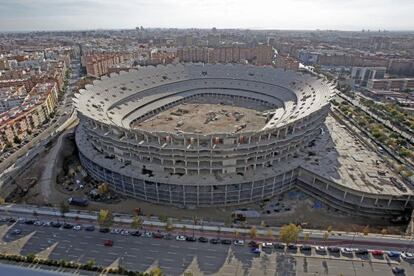Valencia regional government FC
Clubs’ inability to pay back debts makes Generalitat main shareholder in three teams

The ex-premier of Valencia, Francisco Camps, who was forced to step down after his implication in the Gürtel kickbacks-for-contracts corruption scandal, is a fan of Valencia soccer club. So much so that his last act in office was to use the Valencia Finance Institute (IVF) to guarantee the loans that Valencia CF, Hércules and Elche had asked the banks for in recent years: 118 million euros in total.
With the announcement by the debt-racked teams that they are unable to pay back these loans, the lenders will trigger the deal in place with the regional government, making it the biggest shareholder in all three sports clubs. This contravenes the Public Limited Sports Company Law, which prohibits any one entity from holding over five percent of more than one team participating in the same competition.
After the execution of the guarantee against the IVF, current regional premier and Camps' Popular Party successor, Alberto Fabra, has inherited a poisoned chalice. The Generalitat has had to absorb 70 percent of Valencia's shares, and unwillingly now also owns 65 percent of Hércules and 45 percent of Elche. At the same time the region's unpaid invoices from pharmacies, care workers and privately run hospitals are stacking up, while massive cutbacks are being implemented in education, healthcare and scientific research.
Three years ago, Hércules borrowed 18 million euros from Caja Mediterráneo to pay player bonuses following its promotion to Primera, and to cover an unpaid tax bill. The club was owned at the time by Enrique Ortíz, who is also embroiled in a corruption scandal and is accused of illegally financing the Popular Party.
The Generalitat has had to absorb 70 percent of Valencia’s shares, and unwillingly now also owns 65 percent of Hércules and 45 percent of Elche
Camps' hand is also evident in the collapse of Valencia CF. In 2004, he invited the president of the region's business associations, Juan Soler, to assume the presidency of the club to avoid the return of Paco Roig, who was considered a danger to the team. Soler embarked on a pharaonic plan to build a new stadium. As the construction industry crashed, the new stadium remained half-built, the land on which Mestalla stands could not be sold and Valencia's debt rocketed to 550 million euros.
Bancaja, its principal creditor, placed current president Fernando Llorente in charge and the hemorrhage was stemmed through refinancing and the sale each summer of the team's best player.
The generosity of the regional government under Camps did not end there. Levante also accepted a loan of 5.6 million euros from Caixa Penedés. It hopes to start paying some of it back this year. Villarreal, meanwhile, last year refused five million euros of public money, but has a sponsorship deal with Castellón airport that was worth 20 million euros over five years.
The aerodrome is another legacy of Camps' administration. To date, not one plane has landed or taken off from it.
Tu suscripción se está usando en otro dispositivo
¿Quieres añadir otro usuario a tu suscripción?
Si continúas leyendo en este dispositivo, no se podrá leer en el otro.
FlechaTu suscripción se está usando en otro dispositivo y solo puedes acceder a EL PAÍS desde un dispositivo a la vez.
Si quieres compartir tu cuenta, cambia tu suscripción a la modalidad Premium, así podrás añadir otro usuario. Cada uno accederá con su propia cuenta de email, lo que os permitirá personalizar vuestra experiencia en EL PAÍS.
¿Tienes una suscripción de empresa? Accede aquí para contratar más cuentas.
En el caso de no saber quién está usando tu cuenta, te recomendamos cambiar tu contraseña aquí.
Si decides continuar compartiendo tu cuenta, este mensaje se mostrará en tu dispositivo y en el de la otra persona que está usando tu cuenta de forma indefinida, afectando a tu experiencia de lectura. Puedes consultar aquí los términos y condiciones de la suscripción digital.








































